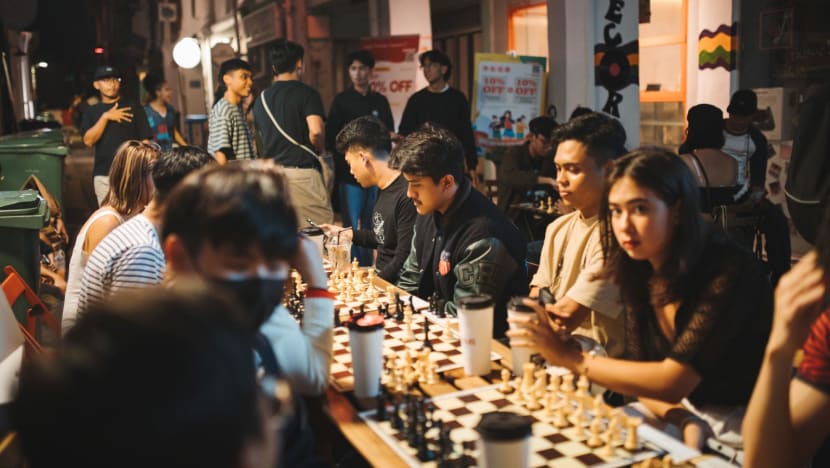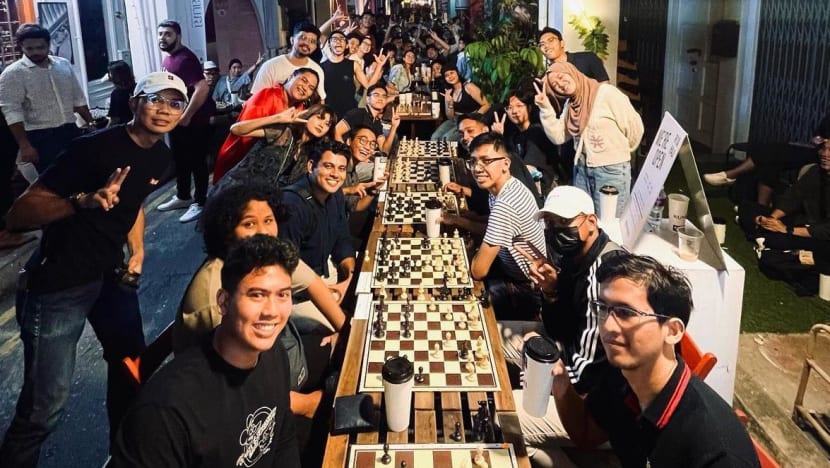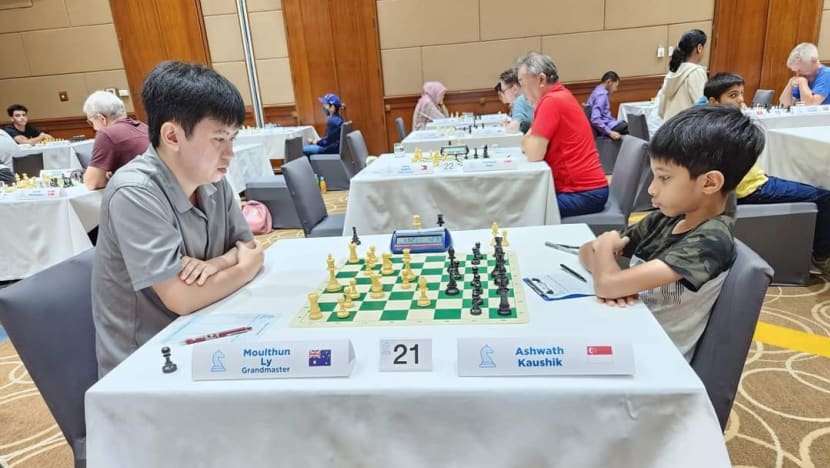IN FOCUS: At the heart of Singapore's chess boom
With Singapore hosting the 2024 World Chess Championship, CNA explores how and why the sport is picking up momentum.

People taking part in a chess event organised by Aliwal Chess Club. (Photo: Aliwal Chess Club)

This audio is generated by an AI tool.
SINGAPORE: As a child, games always piqued Thomas Luther’s interest.
But for somebody with dysmelia - a genetic condition that affects his hands - there were certain activities that Mr Luther could not safely participate in.
While he was still socially connected to most of his peers, Mr Luther was left feeling like an outsider when he wasn’t picked for sports such as football.
“It sometimes made me very sad, because I wanted (to join in) but obviously I couldn’t,” he told CNA.
What was the big equaliser was the game of chess.
“Chess was compensating for that. I enjoyed chess where it offered equal opportunities compared to other sports,” said Mr Luther, who is Singapore Chess Federation's (SCF) training director.
“I was always enjoying the community. For me, chess was always a social thing. I had friends in the chess family but also outside … (But) outside of chess, I always felt a bit more lonely than inside of chess.”
Today, Mr Luther is a grandmaster - the highest title a chess player can achieve.
Chess has seen a resurgence in Singapore, at both the elite level – for players such as Mr Luther – and at the recreational level, where the communal aspect of the game is the main draw.

DRINK TEA, PLAY CHESS
On the surface, chess is an individual game, a battle of wits between two people. But it also draws in spectators who are invested in every match – whether amateur or elite.
In parts of Singapore, you can spot people huddled around two players on stone tables, silently watching but for collective gasps or smiles as a checkmate draws closer.
This type of bond is at the heart of chess, and building a community was one of the reasons Hirfan Romzi decided to start Aliwal Chess Club (ACC) in late 2021.
What started as an open invitation to Mr Hirfan’s friends and acquaintances to hang out, drink tea and play chess has now produced a thriving group that meets at least twice a month.
Today, ACC has become so popular that some leave comments on the group's Instagram account to ask when the next event will be held. There are even tourists who want to know when the next meeting will be.
Back in 2021, only a handful of his friends and acquaintances showed up, but Mr Hirfan noticed that there were passers-by who joined the gatherings. A few weeks later, he decided to start the club.
“In the early days of ACC, actually most people came not for chess but just to hang out,” Mr Hirfan told CNA.
About three years since its inception, ACC has brought chess to places such as cafes, museums and music festivals.
It organises various events such as street chess meets, which typically see about 40 players, and its annual World Chess Day festivals, which draw crowds of hundreds.
The club has a diverse range of participants, from new players to those who play chess competitively, added Mr Hirfan.
“On a personal level, I just love bringing people together, gathering people, just talking to them, making new friends and gaining more connections,” he said.
“Over the years ... there are people coming up to me or texting to ACC (how) it’s nice for them to have found a place, a sense of belonging, (to) really just chill with us and make new friends.”
The club is about more than just chess, said Mr Hifan.
“In ACC itself, chess is actually just 20 per cent of the whole thing. The other 80 per cent is what surrounds it – it’s really the creative community that surrounds it that makes us who we are, always providing platforms for creatives, for musicians, for stuff like that,” he explained.
ACC also provides networking opportunities and in the case of Mr Hirfan, a graphic designer, it has even opened the door to a role in a lifestyle events company.
Singapore Chess Federation CEO Kevin Goh told CNA that the vast majority of chess players in Singapore play recreationally and simply want to learn the game and make new friends.
Without such events, chess players are only able to play online, which "deprives them (of) the communal side of things", he added.
"Eventually the interest will also die down because not all chess players are super interested in improving their game significantly."
The federation is the principal authority over all chess events in the country, and a member of the Singapore National Olympic Council and Singapore Sports Council.

GYM FOR THE MIND
In addition to the community-building aspects of chess, there are other clear benefits.
Dr Ong Mian Li, founder and principal clinical psychologist at Lightfull Psychology, said chess can be likened to a gym for the mind.
“The nature of chess involves predicting and strategising against what your opponent might do,” he explained.
“With chess, you have to predict, memorise a lot of moves … It builds memory, focus and decision-making.
“It’s just like when you lift weights you build muscle, when you play chess it strengthens the mind.”
Although chess does not directly increase one’s IQ, Dr Ong stressed that it builds other important skills, such as focus and resilience.
“It encourages you to embrace failure, find a lesson, even though it’s really painful and annoying,” he explained.
“With kids, their brains are still developing and so when they ‘lose' in life - be it at the playground or in chess, it can feel really huge.
“The game itself really gives parents a great tool … to invite kids to learn and grow, to embrace the idea of failure.”
Given that chess is about making decisions based on objective facts, the same decision-making process can be applied to life choices as well, said Mr Goh.
The SCF chief left his job as a former chief financial officer in a biotech start-up at the end of 2022 to concentrate on the federation full-time.
For some parents, such as eight-year-old Ashwath Kaushik’s mother Rohini Ramachandran, it is about supporting their children’s interests.
“We started it because he was a bit bored and we wanted … something to keep him engaged,” she recalled.
“We didn’t expect at that time he would take to it so much but when he started it, he really liked it.”
A few months after picking up chess at the age of four, Ashwath was able to beat family members, she recalled.
“At that point, we said: ‘Maybe we should get a coach to teach him’ because clearly he’s already learnt whatever he can from us,” said Mdm Rohini.
Earlier this year, he became the youngest player ever to defeat a grandmaster in classical chess after he beat Polish grandmaster Jacek Stopa at the Burgdorfer Stadthaus Open in Switzerland.
“It’s strategic – you need a lot of thinking and it’s very difficult and complex. It’s like a brain teaser,” said Ashwath, when asked what’s the best part about chess.
Ashwath plays about two to three hours of chess during school days and from six to seven hours on the weekends – a mix of playing online and in person at the SCF.
His goal is to become a grandmaster by age 12, which would make him one of the youngest in the world to achieve the feat.

THE CHESS BOOM
At the youth level, 1,606 players competed in the 75th National Schools Individual Chess Championship earlier this year.
This was close to a 20 per cent increase from the number in 2022, which had already been a record.
Given the numbers, an additional venue had to be booked for the competition, said Mr Goh.
The federation has also expanded its National Training Programme (NTP) to include more age groups. Launched in April last year, the programme aims to nurture the country’s next generation of chess talent.
Where it used to comprise under-10 and under-14 squads, there are now under-8, under-12, under-16 and under-20 squads.
“The potential and the interest has always been there,” said Mr Goh, who said he was not at all surprised by the growth of the sport locally.
Ironically, the pandemic benefited chess, said Mr Luther. With COVID-19 restrictions limiting various activities, many turned to the game.
“Many kids during that time started to play chess. We see that kids in the age group of six to 10 learnt the rules of chess, and now they come ... to the SCF for regular training and playing tournaments. This made a huge impact on the numbers of kids,” he explained.
Added to this is the proliferation of chess content online, with chess Youtubers and live streamers, pointed out Mr Hirfan.
And it is this side to chess that appeals to children, said Mdm Rohini.
“There’s a lot of online aspects to chess which have developed and I think that has helped increase the interest, because it’s not just about sitting in the classes and learning,” she explained.
“There’s (also) a little bit of gamification around some of these aspects of solving chess puzzles which would make it a bit more interesting and fun for kids as well. All of that has kind of helped to ... reignite that interest in chess.”
In Ashwath's case, being able to play online also helped speed up his chess development, said his mother.
“He wouldn’t have been able to do very much until all the restrictions eased, until it was safe to go out and meet in person and play,” she recalled.
“He has that option of playing with people around the world, it gives him a lot more practice that he can do at home as well … It played a big role and that has also played a big role in why you see so many strong, younger chess players coming up around the world as well.”
Chess’ reach also expanded with the hit Netflix series The Queen’s Gambit, which inspired a surge of interest when it was released in late 2020.
“We have to thank the Queen’s Gambit,” said Mr Hirfan. “That definitely changed the narrative of chess on a mainstream level.”
It is not just children who are discovering a new love for chess - adults are getting in on the act.
“There are a lot of closet chess fans that I only got to know of in the last two years,” said Mr Goh. “We also try to have more events that are more targeted towards adults.”
The federation restarted a chess league for those 20 years old and above, and brought back the national seniors championship.
“A lot of working adults enjoy the adult chess league. Because there is no stress and the communal side of things is important,” said Mr Goh.
Mr Hirfan has noticed this at ACC as well, where adult players are rediscovering their love for the game.
“A lot of our players (say they) used to play in primary school and back then,” he said. “ACC becomes that bridge to help people to reconnect (with the sport).”
While chess has not entirely shed the stereotype that it is “nerdy”, the demographic of those playing chess at a high level has changed, Mr Goh added.
“More young people are playing chess. We have people like Magnus (Carlsen), undeniably a very cool person, and generally the profile of the best chess players in the world are younger,” he said.
“People feel that if chess players are cool, chess is cool.”
Mr Goh said that he has never seen chess as popular as it is now – and he has played it for 30 years.
It is not just Singapore that is seeing a spike in interest in chess. The sport has also grown particularly in India and other parts of Southeast Asia, International Chess Federation (FIDE) CEO Emil Sutovsky told CNA.
“In Southeast Asia, we see the interest going up … (It is) mostly people are just having fun and playing online and that is normal.
“But we also see growing interest in following competitions, following players, in particular when the representative of the country is fighting for an important championship,” he said.

COMPETING AT AN ELITE LEVEL
What has been important is the constant availability of events for chess enthusiasts to participate in, said Mr Goh.
Recognising the importance of events when it comes to building interest, the federation allows independent entities to hold FIDE-rated tournaments locally.
There are at least five other organisers of these events in Singapore, he said.
The idea is to be as inclusive as possible, provide more access to the masses and give players a chance to improve their FIDE ranking, said Mr Goh.
“We recognise that it’s important to have more (events), and overall it's beneficial for us. We don’t see organisers as competition. Chess needs all the help we can get, so we have to work with each other,” he added.
Earlier this year, it was announced that Singapore beat India's New Delhi and Chennai to win the rights to host the World Chess Championship for the first time.
The tournament will take place between Nov 20 and Dec 15, pitting world champion, China’s 31-year-old grandmaster Ding Liren, against India's 18-year-old grandmaster Dommaraju Gukesh.
“Everyone is super excited,” said Mr Goh.
“There are people who come to me who I haven’t spoken with in 10 years (after) they quit chess, and they all say this is a very exciting event and we’ll definitely turn up.”
The FIDE World Championship match is held every two years. It features the defending world champion and a challenger, chosen through a qualification process culminating in the Candidates Tournament, which includes eight of the world's top players.

Ding and Gukesh, the youngest challenger in championship history, will vie for the crown over a best-of-14 format.
Singapore was a “very natural” choice, Mr Sutovsky. Not only is it a “neutral” venue for the match between Ding and Gukesh, but it has a “strong standing” reputation in hosting important events, he pointed out.
Another event held in conjunction with the World Chess Championship will be the Singapore International Open, where players such as Ashwath will be competing.
“He definitely wants to be there and we’ve already got tickets for some of the matches and he’s really looking forward to it,” said Mdm Rohini.
Also competing at the Open will be Siddharth Jagadeesh, who became Singapore’s youngest local grandmaster earlier this year at 17.
Having competed against Gukesh twice, he is looking forward to watching him compete at the World Championship.
The hope is that the World Chess Championship will strengthen the chess community in Singapore, he added.
“It’s our job to make sure we can continue this momentum,” said Mr Goh. “We have to keep on doing more and more things, but in order to do that, we need support.”
THE POTENTIAL TO SUCCEED
As more people pick up chess recreationally, it has created a positive effect at the elite level.
Mr Goh became a grandmaster in 2020. At the time, he was only the third Singaporean to reach that title, which is awarded by FIDE and held for life.
Fast forward four years, Singapore now has five grandmasters and a woman grandmaster. Grandmaster is the highest title a chess player can attain and can be held by anyone. The Woman Grandmaster is a separate title that can only be held by a woman.
Two grandmasters – Mr Siddharth and 24-year-old Tin Jingyao – are under 30.

“We know that Singapore in recent years has experienced a sort of a chess boom, for many years they have had young players among the top of the world in their age group. Now we see players emerge and they are competing internationally,” said FIDE’s Mr Sutovsky.
“This was a considerable success for a country like Singapore which is much much smaller than India, China and so on … It still manages to produce several players that are of a world calibre.”
The ingredients for success are there, said Mr Goh.
For one, parents in Singapore are willing to invest in their children’s chess dreams, he pointed out. In other countries, one trainer may instruct about 20 students, but the ratio is often one-to-one in Singapore, he added.
It is clear that supportive parents play a key role.
Today, Ashwath competes in about 15 tournaments in a year, said his mother, who left her job and now regularly accompanies him to various international meets.
“Both of us were fairly clear that once he started showing interest and also some potential, we wanted to support him any way we could,” she explained.
Having picked up chess from his father at the age of six, Siddharth has also benefited from the support of his parents, both of whom are still working.
“They were not so strict with school, they allowed me to spend a lot more time on chess than was normal in Singapore. They helped send me to tournaments, travel with me and take a lot of leave,” he added.
Mdm Rohini added that the federation has “done a lot” in having coaching classes and these have helped spur interest in younger children.
“Now they have a lot of avenues to learn it in group settings, apart from having to look for individual coaches which you may or may not find, or may or may not want to do until you see how much interest the kids have,” she said.
“All of them have contributed a lot to increasing the general interest in chess among kids.”
Siddharth attributes some of his success to the help of coaches from the federation such as Uzbek grandmaster Andrey Kvon, having worked more closely with them since 2022. Mr Kvon is also SCF's assistant training director.
“I was having a lot of psychological problems. Coach Andrey (in particular) had many conversations with me to try to get me to be more ambitious,” he recalled.

But there remains much room for improvement when it comes to cultivating talent, said Mr Goh.
“Jingyao and Siddharth were already talented and dedicated even before we came on board,” he explained.
“Now the question is how do we identify these talents, these kids who are passionate so that we can bring them on a five- to 10-year plan, so they can eventually be the next Jingyao or Siddharth.”
And this is where Mr Goh hopes the national training programme will come in.
“It’s going to be a long-term thing, there’s no sugarcoating this,” he explained. “I hope that the NTP can eventually produce talent like that on a recurring basis.”
“From our under-8 and under-10 teams, there are some super promising kids (that are) world-level,” added Mr Luther.
“These are our hopes. (When it comes to) results, the earliest we can see it will be maybe two years, three years, maybe even later. But the hope is there.”
FIDE's Mr Sutovsky is optimistic about what the future will hold for Singapore.
“I believe Singapore will very soon be competing (to be one of the) top 10 Asian teams ... very soon it can be there,” he said.
















